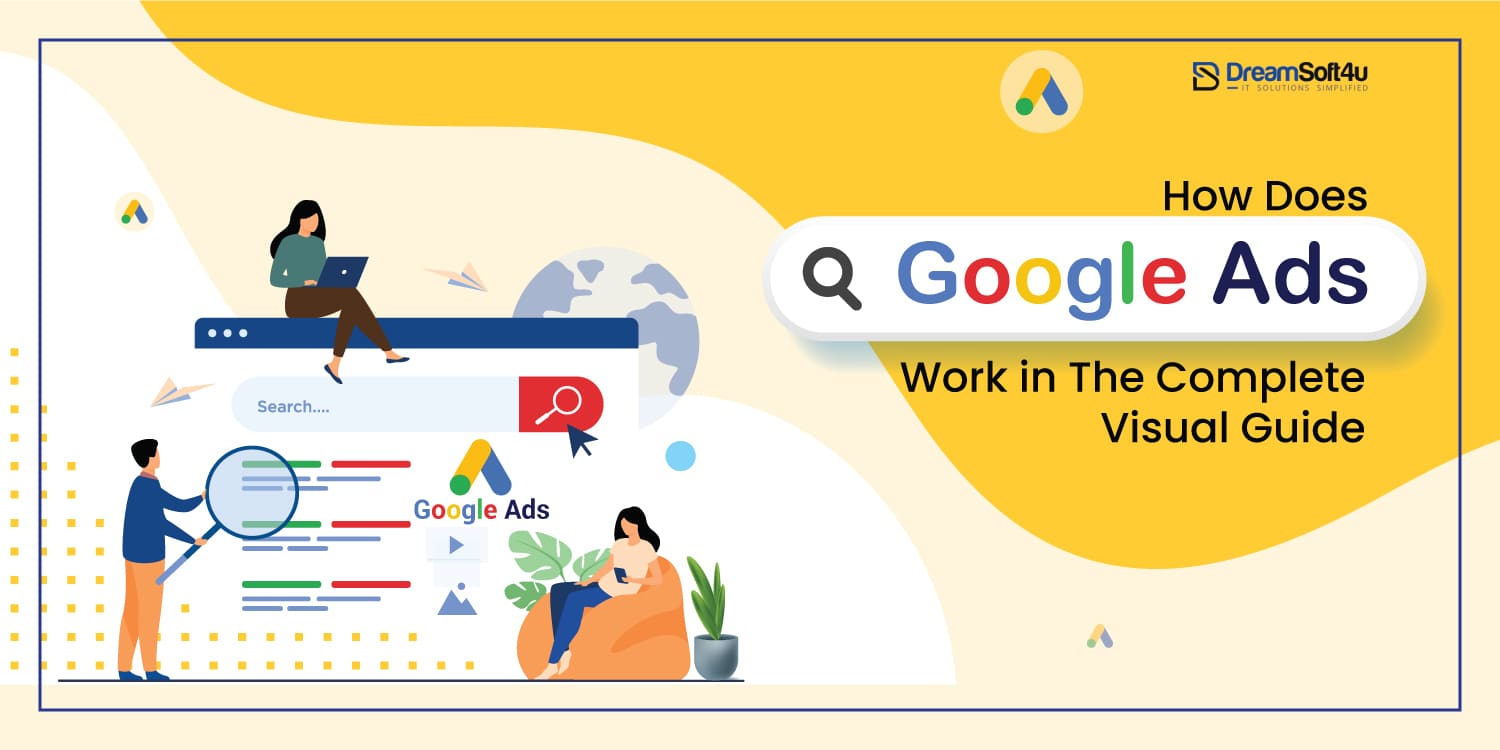You have seen many ads on Google. Numerous businesses also advertise their products through Google Adwords. Have you ever thought about how these Google Adwords work? How much does Google charge advertisers for their ads? How does Google get its revenue from these ads? Here we are to give answers to all these questions via paid search marketing. Firstly, you have to understand what Google Ads is.
Table of Contents
ToggleWhat is Google Ads?
Google Ads is an advertising platform where business owners advertise their products and drive targeted traffic to their websites, which increases their conversion rates and helps in increasing sales. It can be done via pay-per-click or other methods. The method comprises the Google Display Network, search partners, websites, YouTube channels, videos, Google search engine, audiences, mobile apps, and more.
Does Google Ads work?
With the following facts and stats, you can say that yes, it works for the digital marketing business. Let’s see those facts-
- High intent– when people proactively search for something and come across Google Adwords, not when scrolling casually.
- Cost-effective– The ads will show when only relevant and set limits on your spending. You have the option to schedule your ads to appear at optimal times. You can receive 800% ROI from Google ads, which means if you spend $1, you will receive $8 in return.
- Credibility– Google is the world’s most trusted and popular search engine. According to a report, 63% of people click on Google ads, 15% on Amazon ads, 9% on YouTube ads, and 6% on Bin
- Clear measurement– you can adjust your ad copy, bids, and account structure according to your budget.
- Immediate results– Google search ads appear immediately. But SEO takes time to rank organically.
How to Create Google Ads?
You must begin setting up a Google Ads campaign in digital marketing trends. The next step is to choose the most relevant keywords for your business. You will find free helpful keyword research tools like the Google keyword planner. With this, you have to think carefully about the words and phrases that customers will use when searching for your products or services.
The aim of Google Adwords is that your keywords will match up with the ads. Then, your ad will appear when somebody types your targeted words and terms on the internet.
How Do Google Search Ads Work?
Google Search Ads works when the search terms of the potential users match the search network campaigns, advertisers target, and bid on keywords. Advertisers can create ads and landing pages that match their targeted keywords. Advertisers will not get charged unless someone clicks on their ads. Google earns revenue in this way, and advertisers have to pay when someone clicks on their ads.
It is essential to understand the basics of the following before you start creating a Google search ads campaign- the bidding process, how to set up campaigns and ads groups, how quality scores work, landing pages, how to create ads, and how cost-per-click works. Simultaneously, approaching a digital marketing company might help you build a strong campaign.
How Does the Google Ads Auction Work?
Everyone needs to know how the Google Ads auction works. Why is it so? Because customers will understand why they are shown certain ads, advertisers will know why it is essential to maintain their accounts. Let’s see these advertising services.
1. Based on Keywords, Advertisers Create Ads
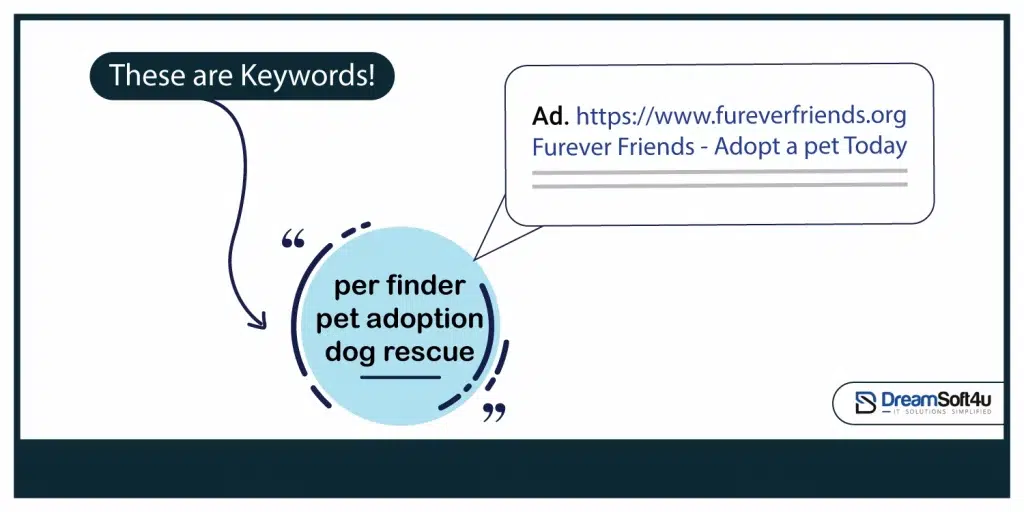
This is keywords bidding. It is not like other auctions. People bid on products in auctions, but in Google auctions, advertisers bid on keywords as we know how they are important for advertisers to advertise their products on Google ads. Let’s see an example of a pet adoption agency. The pet adoption agency wants to advertise its services on Google ads. So, their target keywords may be pet adoption, pet finder, animal shelter, pet rescue, and more. Then they will tell the maximum bid to Google, and most pay for clicked ads.
2. Someone Searches on Google
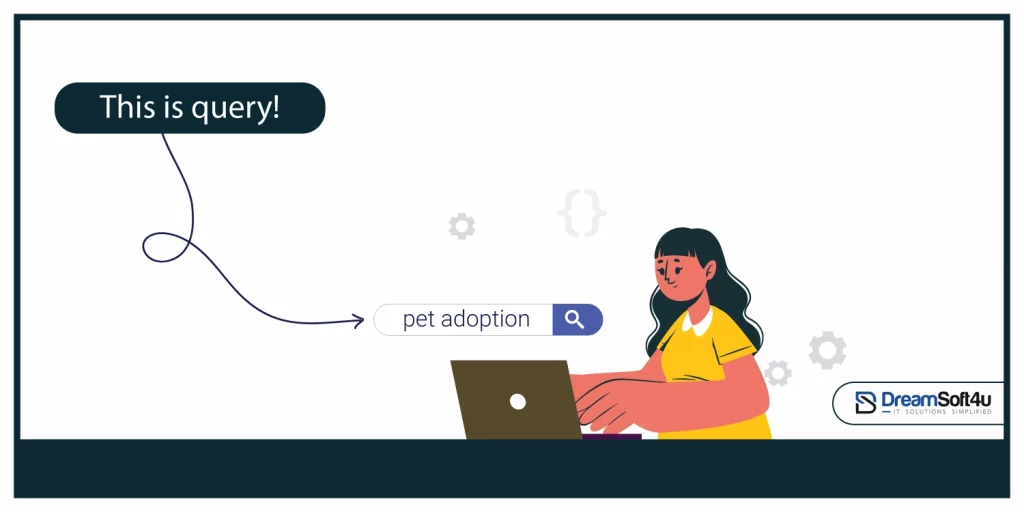
It is called a “query”. Essentially query and keywords are the same. The only difference is that query is the terms users type in, whereas keywords are the terms advertisers target.
Sometimes, We have also seen that the query exactly matches the keywords. This leads us to the next step in social media advertising.
3. Google Looks for Matches
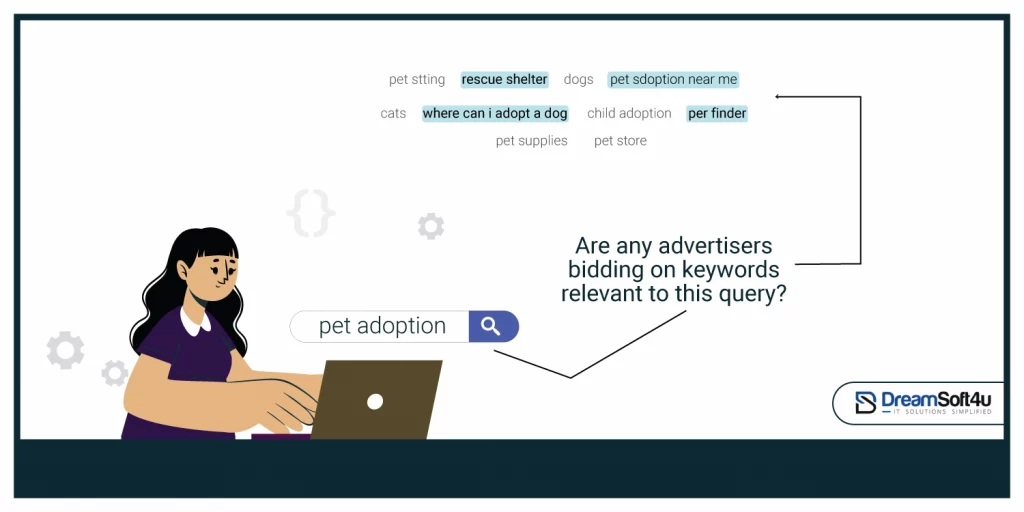
It is called “keyword matching”. Google will scan through the advertiser pool to see that any advertiser is bidding on keywords that Google deems relevant to that query.
4. The Auction Begins
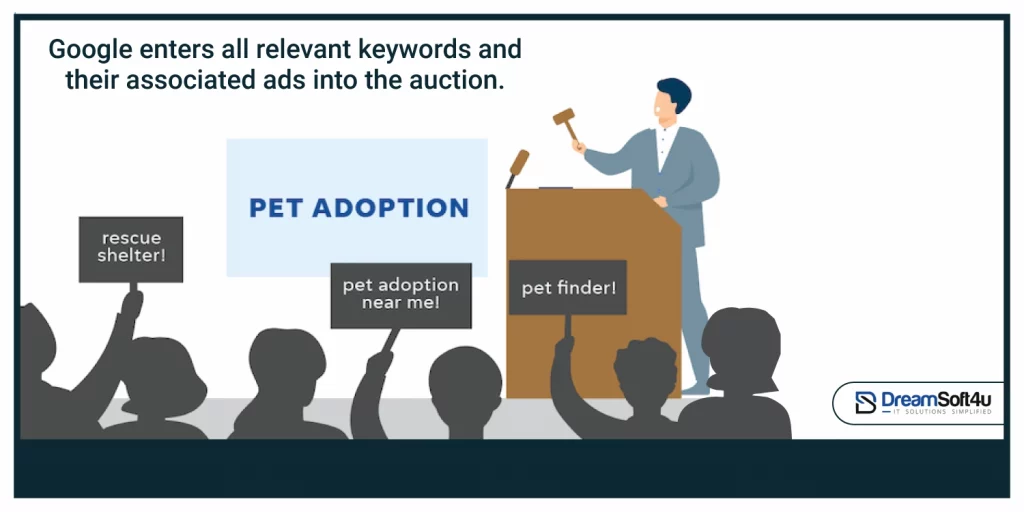
Google chooses one keyword for each account to enter into the auction. But here is a question, how does Google determine the winner? Because there are 4 million Google advertisers and a single ad auction could contain thousands of ads. So, how? Let’s see.
How Does Google Choose Which Ad to Show?
The winner is not the highest bidder. It is the great part about the Google ads auction. Google goes through several factors to see, which is the most relevant and highest quality ad for the user. It is great news for small businesses, which run Google Adwords. Let’s see how Google decides-
Step 1:- Quality score
Google started by scoring each ad a Quality score from 1-10 based on the following three things-
- Relevance: How much is your ad relevant to the intent of the query?
- Expected click: Through rate: will your ad get a click when it shows based on your historic performance?
- User experience: How relevant your landing page is to your ad
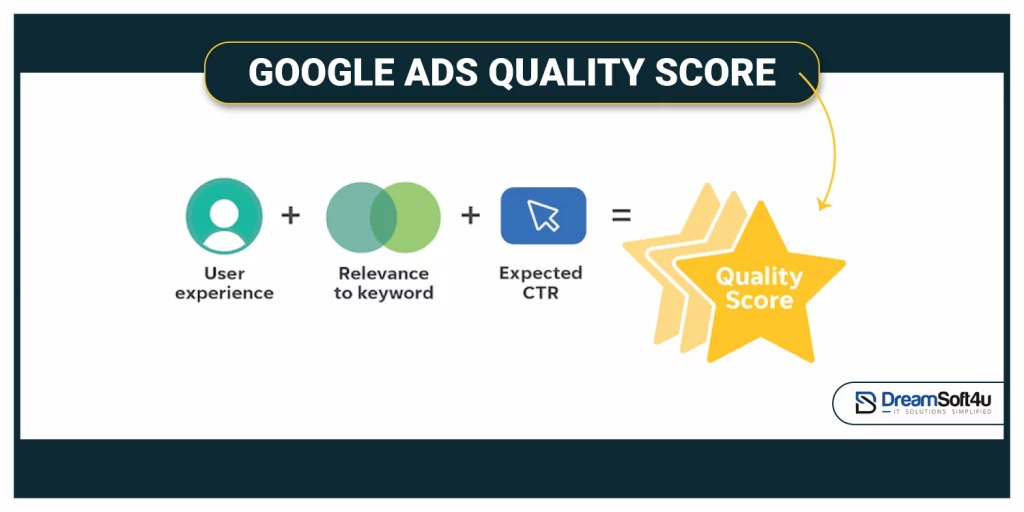
Step2: Ad Rank
After the quality score, Google uses this quality score to calculate its Ad Rank.
Ad Rank= Quality score x maximum bid
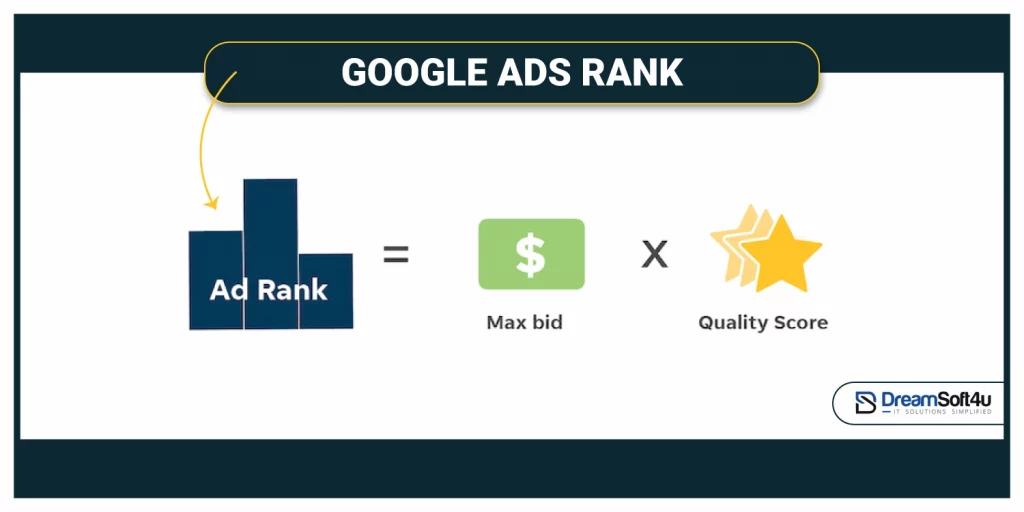
You will get a little confused in the Rank system in Ad Rank. We always thought that Rank one was the best. But in this case, there is nothing like that. Here, the higher your Ad Rank, the better. The Ad Rank is dependent upon the cost of the keyword.
Let’s understand with an example- Ram and Geeta are two persons. Ram has a quality score of 10 and a maximum bid of $5. So his Ad Rank will be 10 x 5= 50. On the other side, Geeta has a quality score of 1 and a higher maximum bid of 8. So, his Ad Rank will be 8. It means he doesn’t make it onto the SERP. It shows Geeta has to improve the quality score.
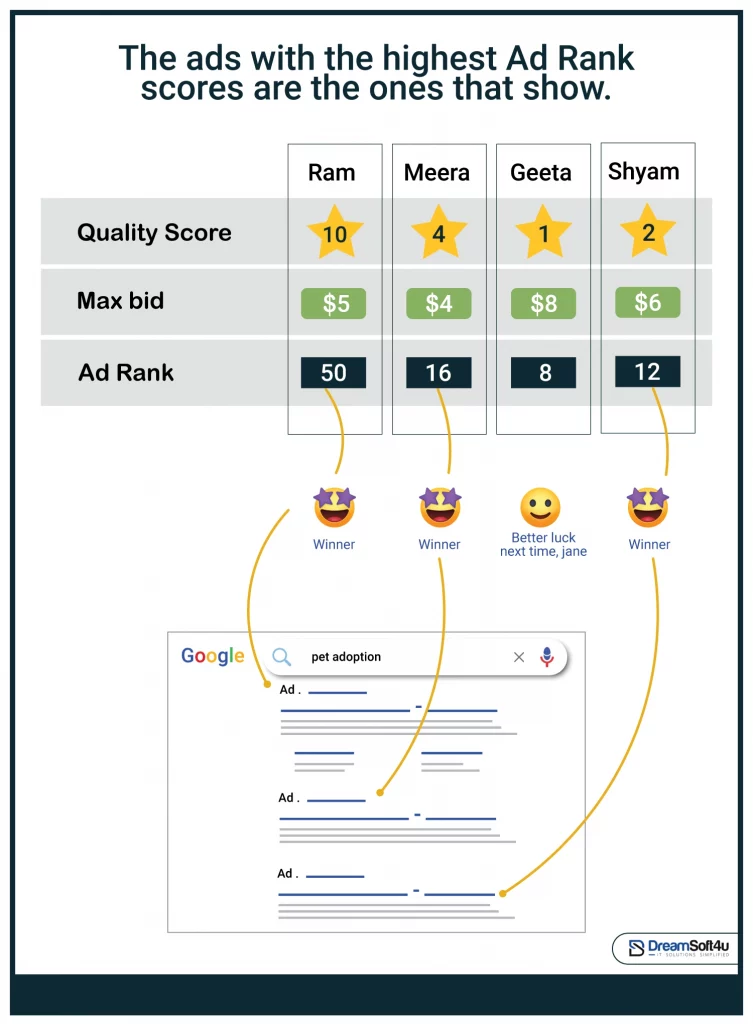
Step 3: Cost Per Click (CPC)
The last step of the auction is price. Advertisers have to pay only when any searcher clicks on their ads. Cost per click is known as Pay per click or PPC. The cost-per-click is not fixed. So, the question is here, how does Google Calculate the Cost per click? Let’s see.
Cost per click= Ad Rank of advertiser below you / your quality score + $0.01.
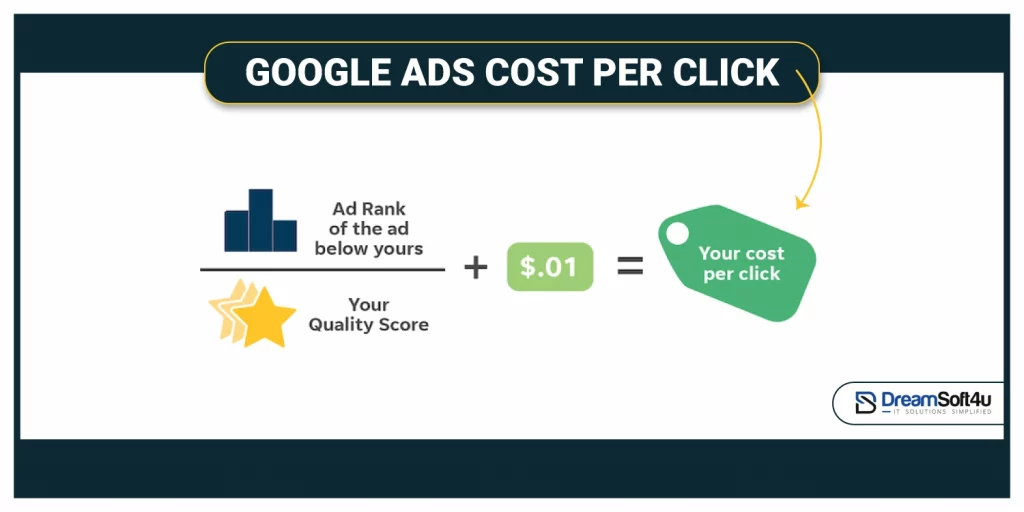
We will make you understand with an example- Ram, Meera, and Shyam are three persons. Ram is in the first position. 10 is his quantity score of Ram, and his Ad Rank is 20. Meera’s ad is directly below Ram’s and has an Ad Rank of 16. So, Ram’s actual cost per click= 16/10+0.01= $1.61.
If we see the case of Meera, she is above Shyam whose Ad Rank is 12. It means Shyam’s ad is below her, and Meera’s quality score is 4. So, the Cost per click of Meera is 12/4+0.01= $3.01. let’s see the Cost per click of Shyam. He has a quality score of 2. The Ad Rank of the ad below him is 8. So, the Cost per click of Shyam is 8/2+0.01= $4.01. You see here, Shyam appears two spots below Ram even though he pays more per click and has a higher maximum bid.
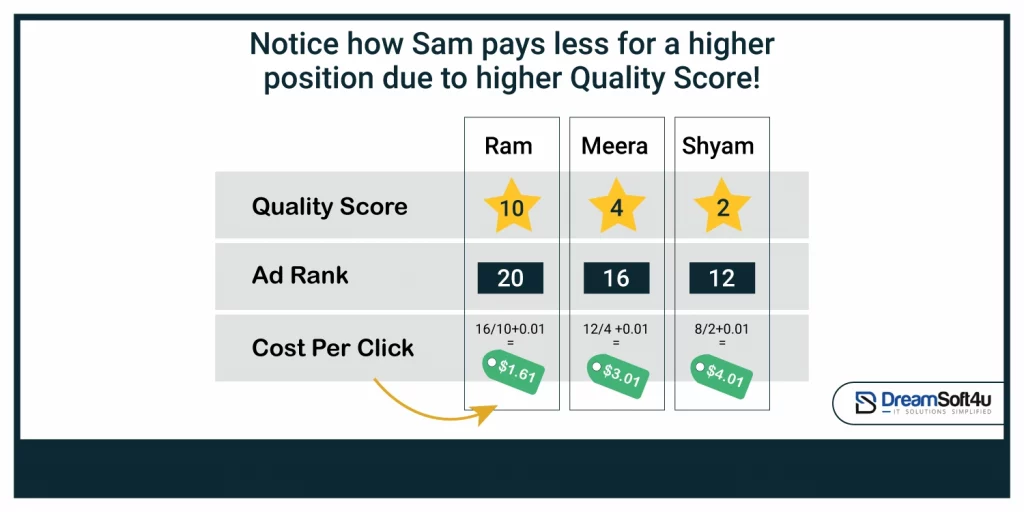
It proves that the maximum bid is factored into the auction. The example also shows us that higher-quality ads reward with a lower Cost per click.
Here it is a win-win fact that searchers only see ads relevant to their ads, and advertisers pay the lowest possible price.
We have covered all relevant points related to how Google Adwords works. Let’s see FAQs to understand better how Google Ads work.
How to build a robust Google Ad network?
You can take the help of our digital marketing professionals, who can build robust & effective Google Ad channels for your business.
98+ Client Retention
FAQs
Q.1. What is a keyword?
A.– A keyword is a term or phrase people type on search engines to find what they are looking for.
For example, a man is looking for a pet. Then he will type on search engines like pet finder, pet adoption agencies, dog rescue, etc. These terms are the keywords for advertisers.
Q.2. How many keywords should I target per ad group?
A.- We suggest you target not more than 20, but Google suggests you target not more than 30.
Q3. Which keywords to bid on?
A.- We will suggest you use Keyword research tools. It will help you to show how many times the keyword is searched per month, the average Cost per click on that keyword, and how competitive the keyword is.
Q.4. What is the difference between a keyword and a query?
A.- Both keyword and query are the terms searched in a search engine. Keywords are the terms that advertisers target while queries are the actual terms users type on search engines.
Q.5. What is the maximum bid?
A.- Maximum bid is the most advertisers are willing to pay for a click on ads. It is used in calculating to determine Ad Rank. Ad Rank will decide whether or not the ad will appear on the SERP.
Conclusion:
In the article, we have discussed Google Ads. How does it work? The article mentioned all the relevant points that will help you understand its working process. We have also tried to explain a few topics with examples. In the article, you will find some FAQs frequently asked on the internet. Simultaneously, we have discussed advertising pay-per-click. We hope that the article will help to understand How Google Adwords works.








